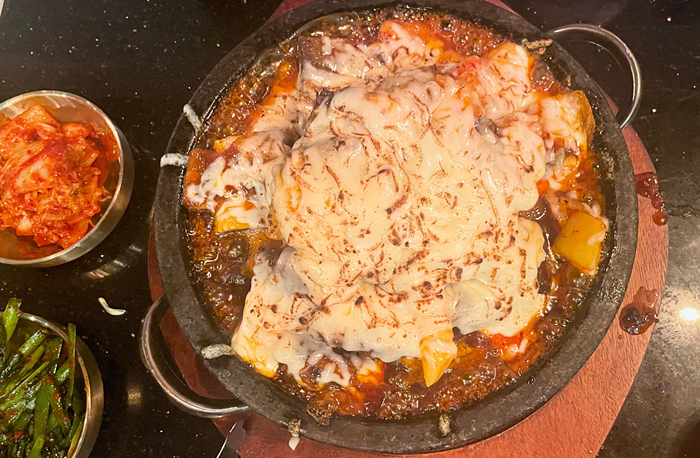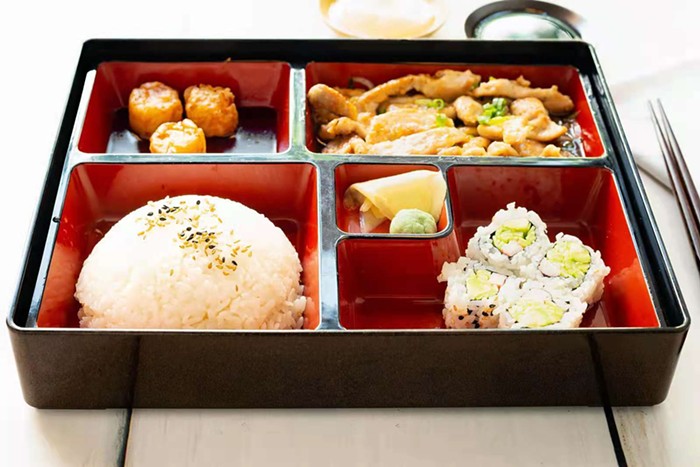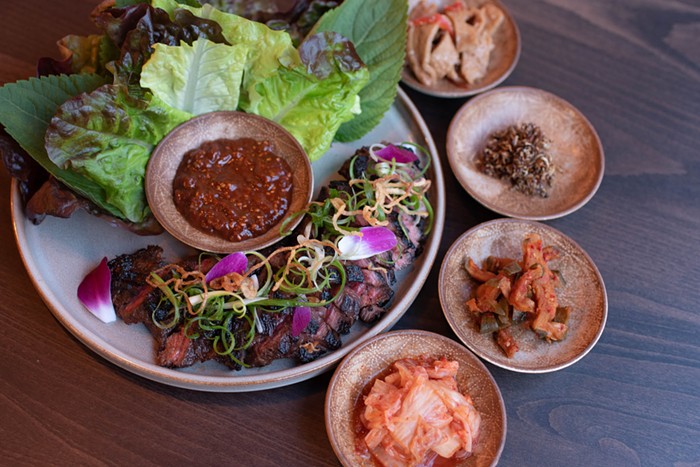After a seven-year ban on downtown food vendors, Seattle is forming a plan to reintroduce taco, kebab, and pizza carts to their natural habitat: the streets. As part of the city's efforts to increase street life in Seattle and make the city more walkable, Mayor Greg Nickels and county health officials are working together to roll back the city's strict regulations on street food. They're also working with Skillet's Josh Henderson and Gabriel Claycamp of the Swinery (and the defunct Culinary Communion) on creating a migrating street-food fair, which they're hoping to get off the ground later this summer.
"Come all ye underdogs, cooks, sous-chefs, and guerrilla culinarists," Claycamp told The Stranger last week, playing the part of carnival barker. "This is happening."
(Meanwhile, two new trucks are also happening: Marination Mobile, set to be up and running this week serving "Hawaiian and Korean curb cuisine," and an imminent pig-shaped Airstream from the Beecher's Handmade Cheese people, serving "the best pulled-pork sandwich you've ever had.")
Current county health regulations require roadside chefs to outfit food trucks with refrigerators, propane heaters, and three dishwashing sinks, among other equipment, or be limited to serving only precooked food like hot dogs or popcorn.
"In the '80s and early '90s, we had more [street] vending going on," says city strategic advisor Marshall Foster, who's been working on the street-food issue in the mayor's office. "From what I've heard, there were a lot of poorly run operations and people who weren't getting health permits," Foster says. "The city, at that time, did not have a very clear permit process."
In 2003, because of what it called overcrowded streets, the city council passed legislation cracking down on mobile vendors, banning food carts in the University District and from Westlake to the stadiums in Sodo. Also banned: vendors selling food near parks and schools. According to the city, hordes of largely unregulated street vendors had popped up along the monorail line downtown and near Seattle's ballparks in the 1980s, skirting health codes and jamming city streets. In addition to the bans, the city's tough street-permitting process—which requires consent of neighboring businesses—and additional county restrictions on types of servable foods pretty much made opening a cart more trouble than it was worth.
Now the city is hoping to streamline the permitting process and change regulations to allow vendors to provide a wider variety of foods—like tamales, piroshki, and noodles—on Seattle's streets. "You go to a city like San Francisco, you see carts grilling meats and selling tacos," Foster says. "You go to Portland, you see people assembling burritos from carts. You can have a reason to actually sit out on the street and enjoy being in the city."
Portland has its street burritos, while Seattle & King County Public Health has a 25-year-old, very short list of foods legal to sell on the street. In additional ridiculousness, until recently the county allowed vendors to sell hot dogs but not veggie dogs—unless they shelled out $350 for a special permit. The list now has been expanded to include things like grilled corn, but it remains much more restrictive than other cities.
The city has yet to work through a number of issues regarding raw foods and wants to mitigate problems with vendors crowding sidewalks in high-traffic areas. The mayor's office is still in the early stages of what appears to be a bureaucratic morass; Foster says they want to have the health code and legislative fine print worked out by next summer. The city hopes to expand the list of allowable street foods, bring food carts to downtown Seattle, and allow food trucks to congregate in parking lots around Seattle, creating miniature urban food courts.
When it comes to the new street-food fair, Claycamp and Henderson both seem to have a clear vision, but it's a bit surprising that the city has put its eggs in their basket. Claycamp gained infamy in Seattle regulatory circles for battling it out with health, fire, and liquor officials over regulations at his erstwhile cooking school, Culinary Communion, and the bacon factory he formerly ran out of his house, the Swinery. Skillet has also had run-ins with the health department and was briefly shut down in September 2007 for operating without a valid permit and for numerous health-code violations.
There's also the question of whether Seattle needs another food fair. To this, Claycamp says, "The Bite of Seattle is boring, no offense. It's the same vendors over and over again. This is the young circuit of street food. We don't want anyone who does the Bite." He says he and Henderson are planning something more akin to a carnival—with "edgy" live music and a beer garden—which will serve more ambitious fare than elephant ears, strawberry shortcake, and roasted corn. The city is pushing to hold the event at Occidental Park in Pioneer Square, but Henderson says he's hoping to have a traveling fair in the "burbs" of Wallingford, Beacon Hill, and West Seattle.
Henderson and Claycamp are still setting up their website, www.seattlestreetfood.org, and figuring out how much insurance, legal fees, and vendor costs will be. "The most exciting thing Seattle has ever seen is about to happen," Claycamp, never at a loss for hyperbole, says. ![]()



















